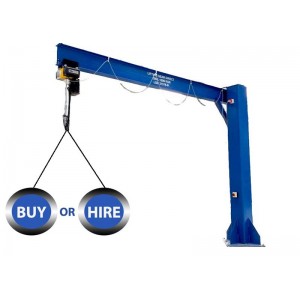For any company with lifting requirements, obtaining the ideal lifting equipment to operate can be an expensive investment and many companies may choose to hire equipment instead of purchasing them outright. Here we explore some of the reasons for and against hiring and purchasing to help you decide
which one is right for you.
The difference between hiring and purchasing lifting gear
Hiring lifting gear is when you pay someone to use their equipment for a certain amount of time before returning it after the agreed hire period. Purchasing lifting gear is of course buying it from a supplier where it is yours to keep.
Benefits of hiring lifting gear
One of the main benefits of hiring lifting gear for some companies is it may only be needed once or occasionally. For example, perhaps your company is involved in construction but only works on taller buildings like high rise flats occasionally so therefore it may be better to invest money elsewhere rather than purchasing equipment specifically for use in this scenario which is unlikely to be used regularly. Similarly, perhaps you run a manufacturing business but your product is quite seasonal in demand so renting equipment may help in those periods of high demand.
It can also be cheaper to maintain rented machines over purchased ones as often this can be written into the conditions of hire for the original owner to handle any defects. Though this is not always the case so you should check with the hiring company first, you could be liable for any repairs etc. However all lifting gear when purchased does have guarantees and warranties, often the onus of maintaining the equipment day to day falls on the owner but renting it from a third party means that extra help and support is possibly there.
Another benefit of renting is it can be easier to access “the latest and greatest” lifting gear. Like most products when new lifting gear can be expensive to purchase outright which can make it harder for smaller companies to compete as they may need to stick to older and less efficient equipment. Through hire of the equipment you may be able to access the latest innovations more cheaply which may help you to be more competitive. Similarly, you can also test these latest innovations to see if they actually work for your company before committing to a purchase.
Disadvantages of hiring lifting gear
When deciding to lease lifting gear, it is important to do your sums and costs. Whilst it may be cheaper in the short term to hire over purchasing, over time a purchased asset will earn itself back whereas hiring often means a continuous payment has to be made which could make the total cost more expensive.
Advantages of purchasing lifting gear
The first disadvantage of hiring lifting gear is of course the equipment isn’t actually yours. For some people this may not be a problem but for others it can be a real sticking point. When the equipment is yours it can also be used for whatever purpose you would like and however much you like whereas with hired lifting gear you can only use it for a set period of time and there may be limitations in the agreement on how and where you can use them.
For some businesses, owning the assets can also be beneficial as it is a real asset within the company so in periods where business could be quieter then selling this equipment can help to raise capital, though it is important to consider that lifting gear does depreciate in value as time goes on so it may not be possible to recover all of the money spent from purchasing the asset (unlike for example a company premises which can fluctuate up and down in value).
Another big advantage of purchasing is more choice – when hiring from a hire company they will have a set range of equipment for you to choose from which limits your options, whereas through purchasing you can access the entire market so you can shop around to find the perfect lifting gear for your precise requirements, some types of lifting gear can be custom made to your bespoke requirements, like lifting gantry cranes, Jib cranes and lifting slings all at a good price.
Finally, purchasing the equipment may result in lower costs overall, especially if you plan to use the equipment for a long period of time as eventually the asset will pay for itself in terms of money saved.
Disadvantages of purchasing lifting equipment
The main disadvantage is of course the upfront cost which can be a high barrier for some businesses to overcome and even if you look into options such as a loan or hire purchase agreement, these can also have quite high initial costs. Similarly, you may also be required to foot the bill for maintenance and repair of your lifting gear.
Another disadvantage is the equipment can become obsolete. As time goes on and more innovations take place in the lifting gear industry, equipment which may have been top of the range at the point of purchase may be obsolete after a few years which can make it less attractive.
Choosing the right option
In many ways, choosing to hire or purchase depends on your business needs and budget. If you only use your lifting gear equipment occasionally, or you are on a budget then hiring could be a more viable option than purchasing the equipment outright.
Although we don't hire equipment, Lifting Gear Direct has over 20 years’ experience supplying quality lifting gear and lifting equipment that is suitable for all professional applications. We offer expert advice and equipment at the best prices, delivered nationwide throughout the UK. Speak to our team by calling 01384 76961 or fill in our contact form to discuss your requirements today.
March 3, 2020
